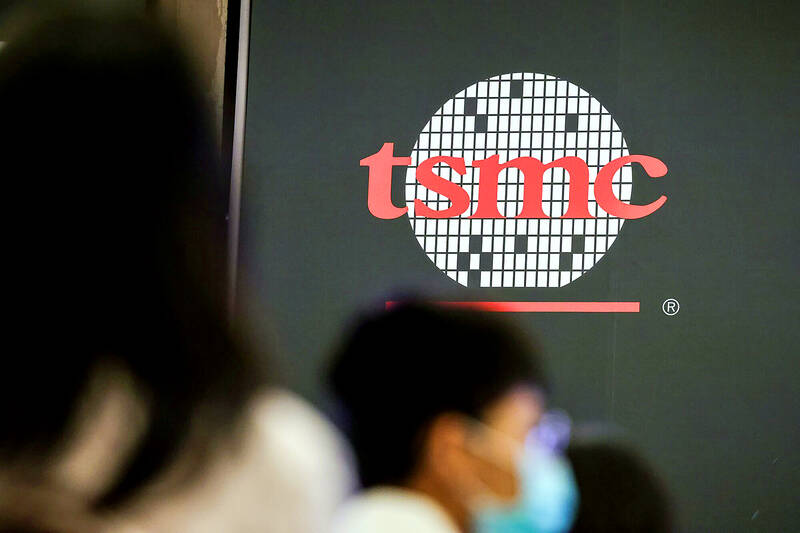Taiwan Semiconductor Manufacturing Co (TSMC, 台積電) last quarter consolidated its leadership position after its share of the global foundry market topped 60 percent, TrendForce Corp (集邦科技) said yesterday.
The contract chipmaker’s market share was 58.5 percent in the final quarter of last year, the Taipei-based researcher said in a report.
TSMC’s revenue fell 16.2 percent sequentially during the January-to-March period to US$16.74 billion, as flagging demand for smartphones and notebook computers reduced utilization of its advanced 7-nanometer, 5-nanometer and 4-nanometer node technologies, TrendForce said.

Photo: Cheng I-Hwa/Bloomberg
TSMC would likely see a slower decline in revenue this quarter, it said.
Samsung Electronics Co, the second-biggest foundry service provider, saw its revenue plummet 36.1 percent quarterly to US$3.45 billion, due to lower utilization of its 8-inch and 12-inch fabs, TrendForce said.
The South Korean company is expected to report the first revenue contribution from its 3-nanometer technology this quarter, the researcher said.
GlobalFoundries Inc ranked third, replacing United Microelectronics Corp (UMC, 聯電), as it benefited from rising orders for chips used in vehicles and industrial devices, as well as the defense sector and government agencies in the US.
GlobalFoundries has said revenue last quarter fell 12.4 percent quarterly to US$1.84 billion.
The company is expected to report a flat second quarter on the back of steady demand for chips used in aerospace, Internet of Things applications and vehicles, TrendForce said.
UMC’s revenue fell 17.6 percent last quarter from the previous quarter, due to weak demand for products made using its 28-nanometer, 22-nanometer and 40-nanometer technologies.
The chipmaker is also expected to see flat revenue this quarter or a slight increase from the previous quarter, TrendForce said.
UMC’s utilization rate of its 8-inch fabs is likely to fall below 60 percent this quarter, as customers scaled back orders for power management chips and microcontrollers, while the utilization rate of its 12-inch fabs could reach 80 percent on the back of rush orders for 28-nanometer chips used in TVs, the report said.
Taiwanese foundries Powerchip Semiconductor Manufacturing Corp (力積電) and Vanguard International Semiconductor Corp (世界先進) fell to eight and ninth place respectively with regards to their global market share, due to sluggish demand for chips used in consumer electronics, TrendForce said.
Overall, the world’s top 10 foundry companies would likely post smaller revenue declines this quarter, as customers have started rebuilding inventory, albeit cautiously, the researcher said.
However, end-market demand remained weak and the companies’ factory utilization would be supported solely by rush orders for Wi-Fi chips and touch-and-display chips, it said.

TAKING STOCK: A Taiwanese cookware firm in Vietnam urged customers to assess inventory or place orders early so shipments can reach the US while tariffs are paused Taiwanese businesses in Vietnam are exploring alternatives after the White House imposed a 46 percent import duty on Vietnamese goods, following US President Donald Trump’s announcement of “reciprocal” tariffs on the US’ trading partners. Lo Shih-liang (羅世良), chairman of Brico Industry Co (裕茂工業), a Taiwanese company that manufactures cast iron cookware and stove components in Vietnam, said that more than 40 percent of his business was tied to the US market, describing the constant US policy shifts as an emotional roller coaster. “I work during the day and stay up all night watching the news. I’ve been following US news until 3am

UNCERTAINTY: Innolux activated a stringent supply chain management mechanism, as it did during the COVID-19 pandemic, to ensure optimal inventory levels for customers Flat-panel display makers AUO Corp (友達) and Innolux Corp (群創) yesterday said that about 12 to 20 percent of their display business is at risk of potential US tariffs and that they would relocate production or shipment destinations to mitigate the levies’ effects. US tariffs would have a direct impact of US$200 million on AUO’s revenue, company chairman Paul Peng (彭雙浪) told reporters on the sidelines of the Touch Taiwan trade show in Taipei yesterday. That would make up about 12 percent of the company’s overall revenue. To cope with the tariff uncertainty, AUO plans to allocate its production to manufacturing facilities in

COLLABORATION: Given Taiwan’s key position in global supply chains, the US firm is discussing strategies with local partners and clients to deal with global uncertainties Advanced Micro Devices Inc (AMD) yesterday said it is meeting with local ecosystem partners, including Taiwan Semiconductor Manufacturing Co (TSMC, 台積電), to discuss strategies, including long-term manufacturing, to navigate uncertainties such as US tariffs, as Taiwan occupies an important position in global supply chains. AMD chief executive officer Lisa Su (蘇姿丰) told reporters that Taiwan is an important part of the chip designer’s ecosystem and she is discussing with partners and customers in Taiwan to forge strong collaborations on different areas during this critical period. AMD has just become the first artificial-intelligence (AI) server chip customer of TSMC to utilize its advanced

Six years ago, LVMH’s billionaire CEO Bernard Arnault and US President Donald Trump cut the blue ribbon on a factory in rural Texas that would make designer handbags for Louis Vuitton, one of the world’s best-known luxury brands. However, since the high-profile opening, the factory has faced a host of problems limiting production, 11 former Louis Vuitton employees said. The site has consistently ranked among the worst-performing for Louis Vuitton globally, “significantly” underperforming other facilities, said three former Louis Vuitton workers and a senior industry source, who cited internal rankings shared with staff. The plant’s problems — which have not